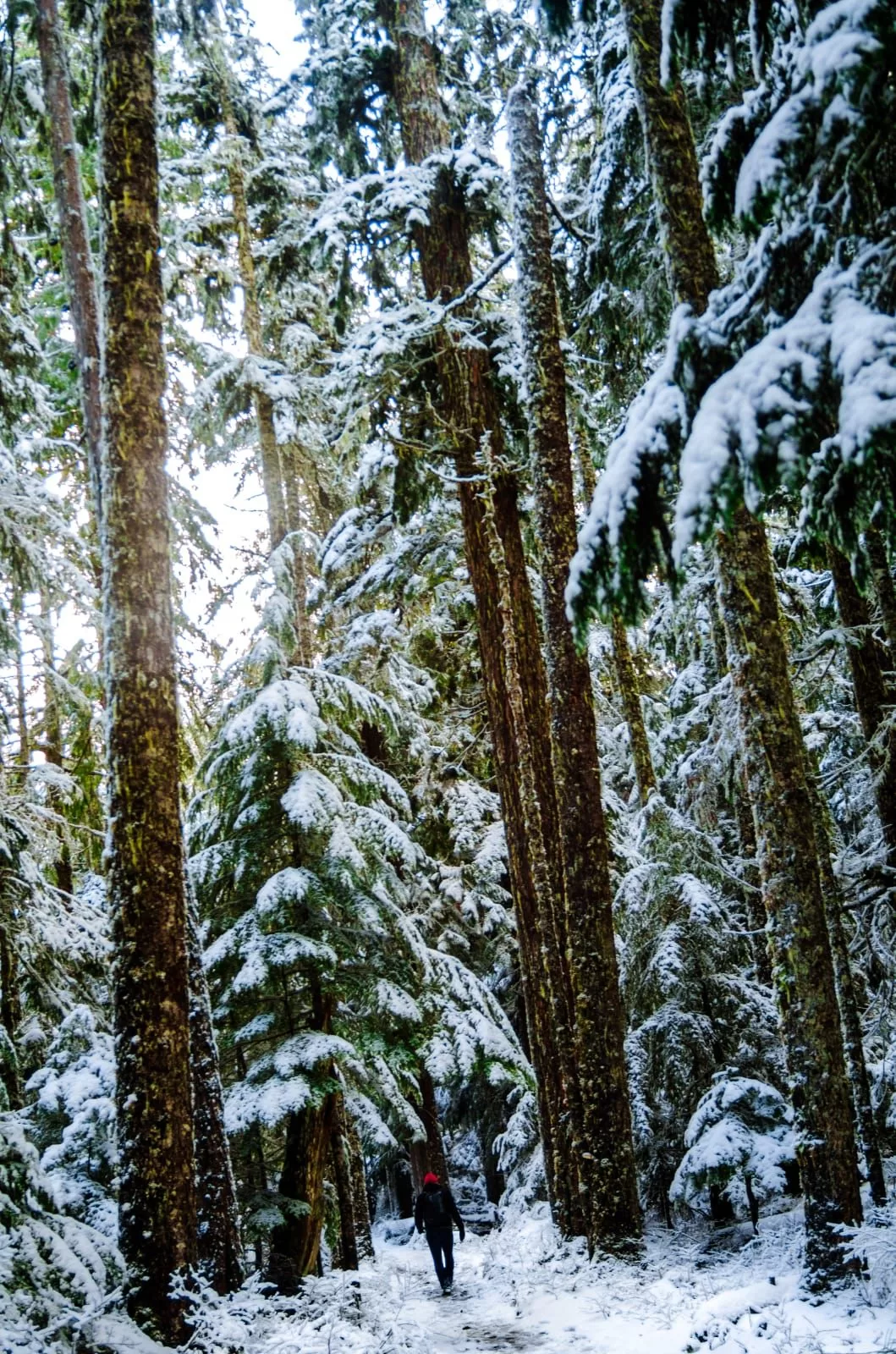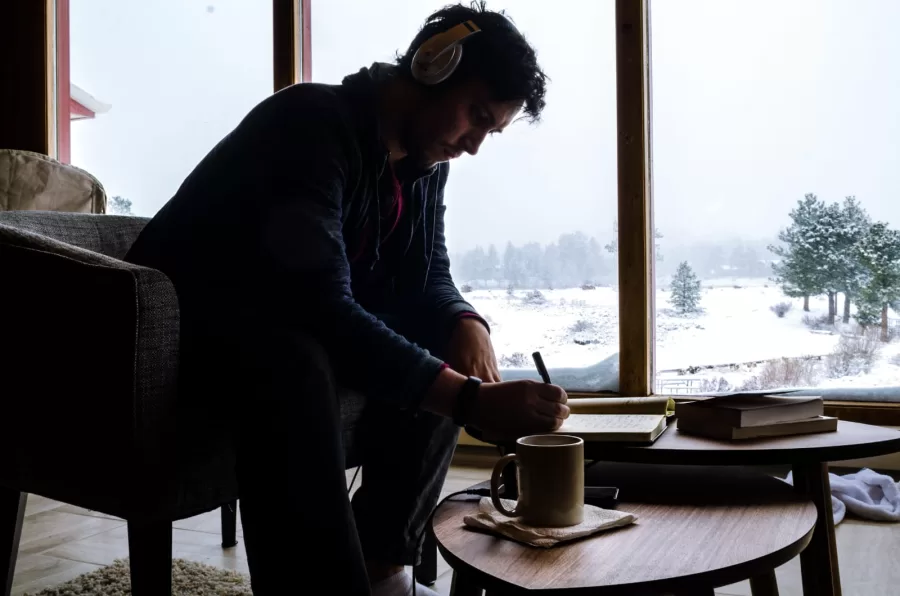How to Navigate a Dark and Lonely Winter

Photo courtesy of Narona Productions. Explore more photos on Narona Productions Instagram.
While there are many beautiful aspects about winter, it can be admittedly hard to make it through the months of darkness and cold for many of us. This is especially true if you find yourself experiencing a lonely winter season. There can be several reasons we feel more isolated in the winter. It may be because the days are shorter, so we naturally become more reclusive than in other seasons. But for some, this may be their first winter in a new city, or even in a new country. Thankfully, there are several ways to learn to cope with, and even thrive in the winter. It starts by adopting the right mindset and establishing a few beneficial practices throughout the winter season.
I experienced my first true winter when I lived abroad for one year in a small town in eastern Germany. When winter came around, not only did I have to adjust to coldness and darkness, (there was a stretch of nearly 60 days without sun), I also didn’t speak the language or have many friends yet. Needless to say, it was a challenging and lonely winter at times. Since that time, I’ve moved to Seattle, a city also known for its dark winters. These experiences have taught me a great deal about living in overcast with a limited social network.
The practices shared can benefit anyone struggling through winter. Most especially those who live in a darker climate and are experiencing the natural loneliness that might arise in the wintertime. Here are some ways to keep your energy up, discover the joys of winter, and even cope with difficult days during a dark and lonely winter.
Keep Your Energy Up
It’s important to find strategies for keeping your energy levels up throughout the season. This can feel especially challenging with the short and sometimes lonely winter days. None the less, implementing these strategies will help you feel happier and more connected in the coming months. Keep in mind, you’ll likely need to experiment and find what tactics work best for you, so don’t get discouraged by a bad day, or even several. Just keep at it and you’ll find what helps you best.
Plan Your Days: Lessons from the Arctic
First and foremost is to move through your days with a sense of purpose. Knowing how you’ll allocate your time is important for keeping feelings of isolation, and even forms of depression at bay.
In Dale Carnegie’s book, How to Stop Worrying and Start Living, he shares an anecdote about Admiral Byrd who spent five months living in the South Pole completely isolated from any other living being. To preserve his sanity, each night he planned the next day’s tasks and how long he’d spend on each task. This kept him busy and filled him with a sense of purpose. He said, “It was wonderful to be able to dole out time in this way. It brought me an extraordinary sense of command over myself…Without that or an equivalent, the days would have been without purpose; and without purpose they would have ended, as such days always end, in disintegration.” While most of us have never spent months isolated in the South Pole, I think many of us are familiar with what it feels like for a day to end in disintegration.
Having a sense of purpose is critical if you struggle with a low mood by the end of the day. For this reason, plan what you want to accomplish each day, whether it’s work, exercise, or social activities. Knowing where you will be focusing your energy will help make a dark and lonely winter much easier.
Vary Your Activities Throughout the Day
In addition to knowing how you’ll be spending your time, try varying the types of activities or tasks. If you spend too much time doing deep, slow work, you’ll likely feel drained and low by the evening. However, if you spend all day jumping between small, fast-paced tasks you will end up feeling scattered and unaccomplished. Varying activities throughout the day will help create a good balance between deep, slow work and high-energy, active tasks. This will help you keep your energy and mood up throughout the day.
I have found this to be especially important for me living and working in Seattle. The days are short and cloudy, and I don’t always interact with others during my workdays. So I had to experiment to find a balance that kept me energized through the end of the day. For example, I write for 2-3 hours in the morning so I can focus on my most meaningful work first. Then after lunch I’ll switch to household chores or run errands around the neighborhood. This allows me to get some movement and quick wins to boost my energy. It also sets a good tone before returning to a slower form of work.
Create a Morning Routine You Look Forward to
The way you start your morning sets the tone for the rest of your day. So, develop a routine that makes you look forward to getting out of bed. Consider a brisk walk to invigorate the body and bring clarity to your mind. Engage in activities that arouses your creativity such as reading or having a conversation with a loved one. Create a small ritual around your morning coffee with stretching, praying, journaling or whatever else works for you. If you start with what you love, it makes it easier to approach each day with a fresh perspective. This will provide a strong foundation for a good day.
Get Outdoors and Be Active

This is certainly not new information, but it bears mentioning nonetheless – get outside during the winter season. Whether you’re adventuring in the backwoods or strolling around your neighborhood, there’s plenty of ways to experience nature. Movement and the outdoors are so important for our mental health and will also drive clarity in your thinking. While it may feel uncomfortable to leave your home when it’s cold or cloudy, the winter outdoors is very invigorating.
If you live in an area that is often overcast, don’t let ‘dreary’ weather stop you from getting fresh air. It is so critical for keeping up your spirits during the winter months. Dress for the weather and lean into it. You may even be surprised by the beauty of the darker days if you allow yourself to embrace it. If you live in a darker region, make it a priority to go outside whenever the sun does come out.
This one was particularly important for me when I was experiencing a dark and lonely winter in Eastern Germany. During this time, I started going on runs in the winter, exploring the forests and pathways around the small village. I discovered a lot about my surroundings during that time. I remember how enchanting the forest seemed as snow began to gently fall on the ground. It seemed special because I was the only one there to witness it, along with a nearby herd of sheep. I went for many long walks and listened to music often. Those songs have inadvertently become the soundtrack of my life from that time. While challenging, I look back on those memories fondly, and feel that I developed a stronger character in that time.
Nowadays in Seattle, I make it a priority to get outside whenever I see the sun – even if it means flexing my schedule. I’ll often go on runs or work from a coffee shop with large windows during workdays so that I am taking in as much sun as possible. Getting outside and taking advantage of sunny days has eased my experience of the dark winters in Seattle.
Create things to Look forward to
Much of the way that we feel in winter will depend on what we choose to focus on. If you choose to view winter as a miserable experience that you just need to trudge through, then winter will be a miserable experience that you’re just trudging through. However, there are also many beautiful facets of winter that no other season contains. You just have to learn how to see it. What you choose to focus on is what you will amplify, and your thoughts determine the reality of your experience. Learn to recognize the beautiful moments that winter offers and plan things to look forward to throughout the season. This can be things like excursions, cozy nights in, small get togethers or trying something new. Here are several ways to really embrace the unique opportunities of winter.
Spend Time Reflecting
Winter is a time for rest and renewal. You can see this in nature as it ceases to produce, but instead enters into a dormant state. It turns inward and rests as it prepares to be renewed with new life in the spring. Just as trees shed their leaves and conserve their energy, we can do the same. This is a time for us to shed our busyness and rest to restore our energy for the coming seasons.
Winter provides a unique opportunity to slow down, connect to your intuition and lay the groundwork for a fruitful year. Especially if you find yourself experiencing a particularly lonely winter, take this opportunity to become reflective on your life. Make plans around what you will nurture versus what parts of your life you will shed. Be cognizant that your energy will naturally be lower in this time of year. Don’t overwhelm yourself with activities and focus on more intimate gatherings and activities when possible.

Photo courtesy of Narona Productions. Explore more photos on Narona Productions Instagram.
Embrace Hygge
Take a cue from the Scandinavians and brew some coffee to take with you on a long morning hike – or for a walk around the neighborhood. Learn to embrace the darkness and the quiet in this time of year by cultivating a cozy home atmosphere. Set up a reading nook by a window with blankets and candles. Plan movie nights and make warm drinks like hot chocolate and mulled wine. Take advantage of the winter weather and try some winter sports like skiing or ice-skating.
If you need inspiration, a wonderful book that helps set the tone for an enchanting winter is The Hygge Life. This book shares how to cultivate warmth and a sense of community through small practices. It’s complemented by a beautiful design and photography that will inspire you to bring these practices into your own life.

Connect with Others in Intimate Settings
Winter is a wonderful time to practice the art of hospitality. Get creative and try to keep the atmosphere cozy and intimate so that get-togethers feel energizing rather than depleting. Simple indoor evenings are one of the best ways to connect in the winter season. Host an evening with friends or acquaintances where you engage in an activity like cooking, making cocktails or baking a desert. Consider activity focused gatherings, like starting a book club in your home, or inviting people over to sing carols. If you choose to go out, opt for places with a soothing ambience – somewhere with low lighting and soft music so you can engage in meaningful conversations.
Again, if you’re finding that you’re experiencing a particularly lonely winter, creating these types of activities can be a great way to gather people together from different parts of your life and get to know acquaintances a bit better. I started hosting girls’ nights in my home in the fall and winter season last year with women from different parts of my life – some of whom I didn’t know very well at the time. Getting together for ‘themed’ nights offered an activity for everyone to do while they got to know each other. This set the stage for connection. We still meet regularly throughout the year, and it has been a wonderful opportunity to develop meaningful friendships.
Learn a New Skill
If there are any skills you’ve been wanting to develop or projects at home you’ve been wanting to work on, now is the time. While the other seasons are wonderfully vibrant and full of energy and productivity, there often is not as much time to invest in at-home activities. In fact, every summer I often find myself wanting to develop a certain skill or work on a project, but simply don’t have the time amidst all the other activities.
Winter can provide the downtime needed to invest yourself into a new skill or craft – such as learning to sew, garden, cook, write, paint, redecorate, etc. The fact that it’s a slower time of year where you’re naturally inclined to spend more time at home is a wonderful opportunity to slowly cultivate a new aspect of your life. This is a particularly good way to spend your time if you’re experiencing a more lonely winter than usual as it provides a purposeful way of spending your time.
If you’re looking to connect with new people or make friends, look for in-person classes. You’ll not only learn a new skill, but also have the chance to meet people who share common interests. Explore what opportunities your local community college offers, browse through Meetup.com and Facebook groups, and check if your local community clubs offer classes and events.
Difficult Periods of a Lonely Winter: Preparing for Spring
Winter can be a difficult time, especially when dealing with life changes. Sometimes it may not be possible to be as connected to others as we’d like. Other times, the weather may have a particularly hard-hitting impact. In these cases, it’s tempting to feel like you wish you were elsewhere, or in another season of life. But realize that this is a time of growth – even when it doesn’t feel like it. Trust that you are where you’re supposed to be.
When you struggle through a dark or difficult day, it may start to feel like every day will be difficult. We can paint a picture of never-ending gloomy days and begin to feel overwhelmed. But know that this is not the case. Each day is a new day and brings new opportunities and hope.
So, learn to stop worrying and live one day at a time. When you do this, you’ll find a bad day is much easier to handle because it’s simply that – a bad day. It is not a predictor of the indefinite future. Tomorrow is its own day. The sun may come out. You may experience a connection that you didn’t expect. You may discover a new exercise or beautiful spot that’s just what you needed to lift your spirits. So, if you have a difficult day – or even several – don’t linger on it. Accept it, get some sleep and tomorrow start anew.
Preparing for Spring
During my winter in Germany, I made an effort to meet and connect with others. I sang at the youth club, attended local events, and went to meet with acquaintances for activities whenever I was invited. I witnessed a growth in my depth of character, and my persistent efforts for connection not only provided points of refuge in the winter but bore fruit in the coming seasons. By the spring, I started to form more meaningful friendships, my language skills improved and there were more activities to engage in.
Remember, your efforts will bear fruit in the spring. The time you spend fostering connections with people, learning, reflecting and growing may not feel like they’re gaining traction, but you’re laying the groundwork for a fruitful season in your life. You just need to have the persistence to continue sowing the seeds and the patience to allow them to flower in the next season.
